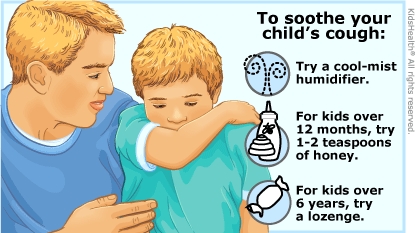Influenza, also known as "the flu," is an infection caused by a virus. Symptoms of the flu often include fever, headache, cough, sore throat, runny nose, tiredness, and body aches. Most kids with the flu feel better in about a week, but some feel tired and weak for a few weeks after having the flu.
Sometimes the flu causes more serious problems, especially in young children and children with other medical problems (such as asthma, HIV, or diabetes). Getting the flu vaccine every year helps protect kids from the flu.



Your child:

Your child:

How does the flu spread? The flu spreads easily from person to person. It can spread when a person with the flu coughs and/or sneezes the virus into the air and someone else breathes it in. It also can spread when someone touches the influenza virus on another person or a hard surface (such as a doorknob), and then touches their own eyes, nose, or mouth.
Your child may still spread influenza up to 10 days after getting sick. To help reduce the spread of influenza and other viruses, teach kids to:
During the coronavirus pandemic, experts found that wearing masks can help protect the community from the spread of COVID-19. Wearing masks can also help stop the spread of flu.
Should kids get the flu vaccine? The best way to prevent the flu is for everyone 6 months of age and older to get the flu vaccine every year. People who get the flu vaccine still might get the flu, but the illness is likely to be less serious.
Is there treatment for the flu? Antiviral medicines are available to treat the flu. Health care providers may prescribe antiviral medicine for very ill children, very young children, children with some types of medical conditions (such as asthma, HIV, or diabetes), or kids who are more likely to have problems if they get the flu. The medicine can shorten the illness by 1–2 days. It works best if children start taking it within 48 hours of the start of the flu.
Antibiotics can't treat the flu because they only work against bacteria, not viruses.